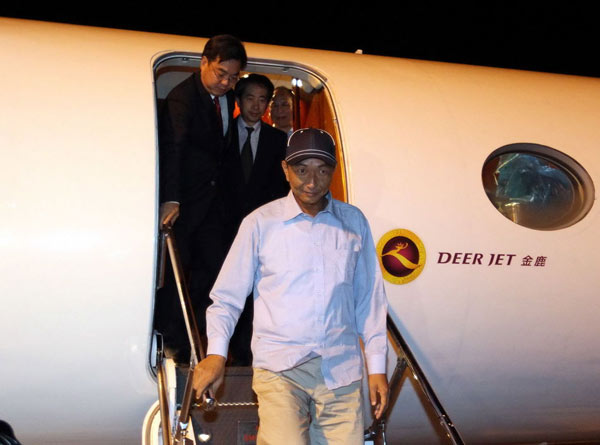Chinese trawler captain back home
The Chinese trawler captain Zhan Qixiong arrived safely in Fuzhou, capital of southeast China's Fujian Province early Saturday morning by a chartered plane after he was illegally detained by Japan.
|
|
|
The Chinese trawler captain Zhan Qixiong arrived safely in Fuzhou, capital of southeast China's Fujian Province early Saturday morning by a chartered plane after he was illegally detained by Japan.[Xinhua] |
"I was so happy when I was told that my brother would soon return," said Zhan Yuehong, a sister of the captain. "After all these sleepless nights, I can finally have a good rest now."
The sister said she is preparing a bowl of noodles with eggs for her brother, a local tradition to keep off bad spirits when a family member returns from an ordeal.
Chinese Foreign Ministry said in a statement after the captain's return that the Chinese government expressed "strong protest" against Japan, whose detention, investigation or any form of judiciary measures for the Chinese trawler and fishermen are unlawful and invalid.
China asked the Japanese side to make apology and compensation for the incident, the statement said. It also said the two sides should resolve the problems of Sino-Japanese relationship through dialogue and consultation.
On Sept. 7, two Japan Coast Guard patrol ships and a Chinese trawler collided in waters off China's Diaoyu Islands. On the following day, the Japan Coast Guard illegally seized the Chinese trawler and detained the trawler's captain and 14 fishermen on board, drawing strong protests from the Chinese government and people.
The Japanese side freed the 14 fishermen and the boat on Sept. 15, but continued to hold the captain. A Japanese court announced on Sept. 19 the trawler captain's detention would be extended by another 10 days.
China has repeatedly urged Japan to unconditionally release the Chinese captain to avoid further damaging bilateral ties, warning "strong counter measures" if Japan failed to do so.
China has already halted bilateral exchanges at and above the provincial and ministerial levels. It has also suspended contact with Japan on the issue of expanding aviation rights between the two countries.
"The Japanese side bears full responsibility for the current situation,and it shall bear all the consequences that arise," Chinese Premier Wen Jiabao said when meeting with Chinese nationals and Chinese Americans in the United States.
In the mean time, the number of Chinese citizens traveling to Japan as tourists has already declined. Many Chinese citizens and businesses have recently canceled their planned trips to Japan.
Observers of Sino-Japanese relations said the prolonged detention of a Chinese trawler captain "severely harms" Chinese people's trust in Japan and undermines the "sound interactions" the two countries have achieved in recent years.
Since the collision happened on Sept. 7, "Diaoyu Islands" and "Zhan Qixiong" have become the most searched terms in China's Internet community.Also, Internet bulletin boards on several major Chinese news portals have been overwhelmed with messages calling for Japan to immediately and unconditionally release Zhan.
The messages said that the Diaoyu Islands have always been an integral part of China and it's within the rights of Chinese fishermen to fish in the waters around the islands.
The Diaoyu Islands have been Chinese territory since the early years of the Ming Dynasty (1368-1644). Maps printed in Japan in 1783 and 1785 that marked out the boundary of the Ryukyu Kingdom show that the Diaoyu Islands belong to China.
 0
0 







